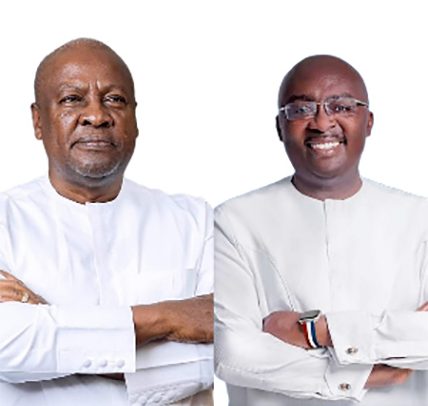The recent appreciation of the Ghana Cedi has sparked a sharp debate between former Vice President Dr. Mahamudu Bawumia and current President John Dramani Mahama, with both leaders crediting different policies and approaches for the currency’s performance and broader economic recovery.
No NDC Policy Caused Cedi Gains – Bawumia
Dr. Mahamudu Bawumia, who is also the 2024 New Patriotic Party (NPP) presidential candidate, dismissed claims that the National Democratic Congress (NDC) government deserves credit for the cedi’s recent gains.
Speaking during his ‘Thank You Tour’ in London, Dr. Bawumia challenged the NDC to point to any policy they have implemented that directly influenced the currency’s recent strength.
“If you are to ask the NDC to point out exactly what policy they have implemented that has resulted in the appreciation of the cedi, they cannot tell you one that has actually been implemented,” he said emphatically, adding, “Not something that has been promised or talked about—something real. There is no such policy.”
Dr. Bawumia explained that the NDC administration only passed its 2025 budget in March and has yet to begin significant spending or launch initiatives that could impact the currency. “They’ve not even issued any contracts or made any payments of note. So you cannot ascribe what is happening to the cedi to any policy they’ve implemented,” he added.
Instead, Dr. Bawumia attributed the cedi’s gains to policies enacted under former President Nana Akufo-Addo’s administration of which he was part of, with particular focus on the gold purchase programme launched in 2022. He recalled how Ghana’s gold reserves were a mere 8.7 tons before the programme but grew to 30 tons in just two years, equating to $5 billion in reserves accumulated through domestic acquisition.
“Ghana, as Africa’s largest gold producer, had just 8.7 tons of gold reserves. Meanwhile, countries like the US have over 8,000 tons. That reserve strength gives confidence in a currency,” Bawumia said and continued, “You don’t need to export to earn gold. You just dig it up or buy it with cedis. It was a faster and easier way to shore up reserves.”
He argued that this build-up of gold reserves, alongside the gold-for-oil programme, shielded the economy from collapse and created a foundation for the currency’s stability.
Dr. Bawumia also pointed to global factors and the NDC’s limited spending as contributing to the cedi’s current position.
“The US dollar is on a downward trend globally, which is strengthening other currencies. In Zambia, for instance, the Kwacha has gained because of the same global trend,” he noted.
He further claimed that the NDC’s failure to pay Independent Power Producers (IPPs) and contractors is temporarily reducing demand for foreign exchange, artificially easing pressure on the cedi.
“I believe what we put in place will help maintain stability in the cedi. But we’ll see how the NDC manages it going forward,” he concluded.
Robust Policies Driving Economic Recovery – Mahama
In response, President John Dramani Mahama has attributed the recent cedi stabilisation and signs of economic recovery to his government’s decisive and robust policy measures since taking office in early 2025. Speaking at the Ghana-European Union Business Forum in Accra, President Mahama painted a picture of an economy that was under severe fiscal distress upon his administration’s arrival.
“We had to take urgent steps with the presentation of a budget to Parliament that made a steep adjustment in the primary balance—from negative 3.9% of GDP to a projected positive 1.5% by the end of this year,” Mahama said.
“These bold and targeted interventions are now beginning to show early signs of economic recovery and renewed momentum,” he intimated.
He pointed out that Ghana’s 2024 GDP growth of 5.7%, largely driven by mining, construction, and services sectors, and pointed to data from the Bank of Ghana showing a sustained pickup in real economic activity early in 2025.
According to him, inflation, which peaked at 23.8% at the end of 2024, has started to ease, dropping to 21.2% by April.
President Mahama explained that the Ghana Cedi, after depreciating by 19.2% in 2024, has appreciated by 3.9% against the US dollar by the end of April 2025. This, he said, is supported by strong foreign exchange inflows, improved trade balances, and growing investor confidence.
“Our gross international reserves have also improved significantly—from $8.98 billion in December 2024 to $10.6 billion by April 2025—equivalent to nearly five months of import cover,” the President disclosed.
This increase reflects enhanced export earnings, particularly from gold and non-traditional exports, along with timely disbursements from multilateral partners, President Mahama said.
He added that fiscal discipline is a key factor, with the fiscal deficit dropping from 7.5% of GDP in 2024 to 6.4% in the first half of 2025, on track to meet an end-year target of 3.1%.
The President also emphasised his government’s efforts at expenditure rationalisation, improved domestic revenue mobilisation, and strong anti-corruption measures as critical to the recovery.
“The figures, though early in the year, indicate a disciplined and inclusive economic recovery,” he said, stressing the global shift from multilateral to more transactional economic relationships.
Touching on Ghana’s trade ties with the European Union, the President noted that total exports reached $20.4 billion in 2024, with a trade surplus of GH₵44.7 billion. Gold, mineral fuels, and cocoa accounted for over 82% of total exports.
He reaffirmed the EU’s role as a key development and trade partner, pointing to the Business Forum as a sign of commitment to deepen bilateral cooperation.
By Ernest Kofi Adu & Prince Fiifi Yorke


